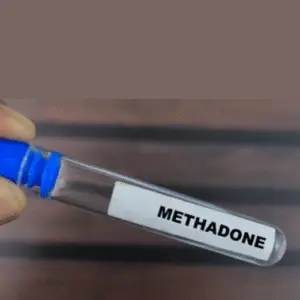Methadone is a medication that has been used for decades to treat opioid addiction. It works by binding to the same receptors in the brain as opioids, but without producing the same high. This can help to reduce cravings and withdrawal symptoms, making it easier for people to stop using opioids.
What is Methadone?
Methadone is a medication that is used to treat opioid addiction. It is a long-acting synthetic opioid that is similar to morphine. Methadone is taken orally and works by binding to the same brain receptors as opioids, but it produces a much weaker effect. This reduces the risk of overdose and decreases the intensity of withdrawal symptoms.
Methadone has been used to treat opioid addiction for over 50 years and it is considered to be one of the most effective treatments available. It is estimated that methadone reduces the risk of death from overdose by 90%.
Methadone treatment is often combined with counseling and other support services. This comprehensive approach can help people to stop using opioids, stay in treatment, and avoid relapse.
Who should not take Methadone?
Methadone is a powerful medication that is used to treat opioid addiction. It is important to understand that Methadone should only be used under the care of a medical professional and that it is not appropriate for everyone. There are some people who should not take Methadone, including those who:
-Have a history of substance abuse
-Have a history of mental illness
-Are pregnant or breastfeeding
-Have liver or kidney disease
-Have heart disease
How is Methadone taken?
Methadone is a medication that is taken orally, typically in the form of a pill or liquid. It is important to follow the instructions of a medical professional when taking methadone, as it can be dangerous to take too much or too little. The dose of methadone will be different for each person and will depend on factors such as the severity of addiction and other medications that are being taken.
What are the risks of taking Methadone?
Methadone is a medication that is used to treat opioid addiction. It is a synthetic opioid that works by binding to the same receptors in the brain that other opioids, such as heroin, bind to. Methadone is a long-acting medication, which means that it stays in the body for a long time. This can be an advantage when someone is trying to quit using opioids because it can help to prevent withdrawal symptoms and cravings.
However, it can also be a disadvantage, because if someone takes too much methadone, it can be very dangerous. Methadone can cause slow or shallow breathing, and it can also cause drowsiness or coma. If you are taking methadone, it is important to be aware of these risks and to take the medication exactly as prescribed by your doctor.
How does Methadone work to treat Opioid addiction?
Methadone is an opioid medication that is used to treat pain and addiction. It works by binding to the same receptors in the brain that other opioids, such as heroin, bind to. This prevents the person from feeling the effects of withdrawal and reduces cravings.
Pros and Cons of using Methadone to treat Opioid addiction
When it comes to treating opioid addiction, there are a variety of different approaches that can be taken. One option that is often used is methadone, which is a medication that is designed to help reduce withdrawal symptoms and cravings.
There are both pros and cons to using methadone for treatment. On the positive side, methadone can be very effective in helping people detox from opioids and stay off of them in the long term. It can also be less expensive than some other treatment options.
However, there are also some downsides to methadone treatment. For one, it can be difficult to access in some areas. Additionally, some people may find that the withdrawal symptoms associated with coming off of methadone are worse than those associated with coming off of opioids. Finally, there is always the risk of relapse when taking any kind of medication for addiction treatment.
What are the side effects of Methadone?
Methadone is a medication that is used to treat opioid addiction. It is a long-acting synthetic opioid that is similar to morphine. Methadone is taken orally and works by binding to the opioid receptors in the brain, which reduces the symptoms of withdrawal and cravings.
Common side effects of methadone include drowsiness, constipation, dry mouth, and sweating. Other potential side effects include dizziness, headache, nausea, vomiting, and changes in appetite. Some of these side effects may go away with time as your body adjusts to the medication.
It is important to talk to your doctor about any side effects that you experience while taking methadone. Some side effects may be serious and require medical attention.
How long does treatment with Methadone last?
Methadone is a medication that is used to treat people who are addicted to opioids. It is a long-acting medication, which means that it stays in the body for a long time. Treatment with methadone usually lasts for several months, or even years.
Alternatives to Methadone treatment for opioid addiction
When it comes to treating opioid addiction, methadone is often the go-to option. However, there are other ways to approach this problem. Here are some alternatives to methadone treatment for opioid addiction:
1. Buprenorphine: This medication is similar to methadone in that it helps to reduce cravings and withdrawal symptoms. It can be taken orally or injected and is often used in combination with naloxone (an opioid antagonist).
2. Naltrexone: Naltrexone is an opioid antagonist that works by blocking the effects of opioids. It is available in pill form or as an injection and can be used either as a short-term detoxification tool or as a long-term maintenance medication.
3. Suboxone: Suboxone is a combination of buprenorphine and naloxone that is used to treat opioid addiction. It comes in the form of a sublingual film that dissolves under the tongue.
4. Vivitrol: Vivitrol is an injectable form of naltrexone that is used as a long-term maintenance medication. It is given once per month and patients
What One Stp Psychiatry can do?
In conclusion, methadone is an effective medication for treating opioid addiction. If you or someone you know is struggling with opioid addiction, dont hesitate to talk to us.
Call us for free consultation: Ph: (754) 270-6322
Address: 8910 Miramar Pkwy Office 309G, Miramar, FL 33025




